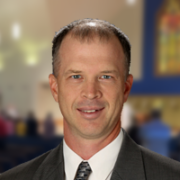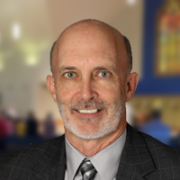Sermon – December 31, 2020 – New Year’s Eve
Printable PDF: 12-31-2020 New Year’s Eve Sermon
Pastor Jacobson ~ New Year’s Eve ~ Dec. 31, 2020 ~ Lamentations 3:19-26
19I remember my affliction and my wandering, the bitterness and the gall. 20I well remember them, and my soul is downcast within me. 21Yet this I call to mind and therefore I have hope: 22Because of the Lord’s great love we are not consumed, for his compassions never fail. 23They are new every morning; great is your faithfulness. 24I say to myself, “The Lord is my portion; therefore I will wait for him.” 25The Lord is good to those whose hope is in him, to the one who seeks him; 26it is good to wait quietly for the salvation of the Lord.
REFLECT ON 2020 & REFOCUS ON 2021
In preparation for this New Year’s Eve service I looked at the service from last year. I laughed out loud when I read the sermon theme. It wasn’t a full-blown belly laugh, more of a light “you have to be kidding me” chuckle. The theme was: WHAT CAN THE FAITHFUL EXPECT IN 2020? I was amused when I read the theme, and I thought you might be amused, too. The sermon talked about how the Lord watches over us and draws us closer to him, and the Lord certainly did that. It did not talk about a worldwide pandemic, wearing a mask, canceling church, and social distancing.
In a little over five hours, 2020 will be history. It’s not my intention to rehash 2020 nor is it my intention to make predictions about 2021. You can find television shows or magazine articles that will do that very thing. No, tonight as we gather with our thoughts divided on what was in 2020 and what will be in 2021, I want to pause and ponder on what God is up to at this point in our world’s history. What should we as Christians make of the problems we have been and are enduring? And what should we as Christians make of the promise God gives us in his Word, “… his compassions never fail. They are new every morning?”
- Reflect on Life’s Problems
There are many bad years in our world’s history. 2020 is one of them, but if we were to debate the ten worst years in the history of our world, 2020 wouldn’t come close. One year that would be in that conversation is the year 586 B.C. In the year 586 B.C. the city of Jerusalem was destroyed, the temple was burned to the ground and the majority of the people who weren’t killed in the battle were taken as prisoners of war to Babylon. Only the poor were left in Jerusalem. The prophet Jeremiah was one of those people.
The author of Lamentations was probably Jeremiah. The prophet Jeremiah has been nicknamed the weeping prophet because his prophecies often foretold heartbreaking events. Jeremiah under divine inspiration had predicted the destruction of Jerusalem and the 70 years of captivity in Babylon. Jeremiah could see the problems coming, but that foreknowledge did not make his current reality any easier. Reflecting on life’s problems Jeremiah laments, “I remember my affliction and my wandering, the bitterness and the gall.” Affliction is hardship. Wandering means without a home. Bitterness leaves a bad taste in one’s mouth. Gall is difficult to define, but one definition speaks of an unpleasant smell. With the word “my” Jeremiah is claiming ownership of a difficult life, a life of problems. Such a life affects the soul. Jeremiah admits, “My soul is downcast within me.”
Martin Luther and Katharina Von Bora married in 1525. The story has been shared that one day when Luther was depressed, Katie put on a black dress. Luther asked her: “Are you going to a funeral?” The response she gave him was, “No, but since you act as though God is dead, I wanted to join you in mourning.” The Prophet Jeremiah and our Lutheran Reformer Martin Luther are among the great believers in the church, and yet, they too struggled with downcast souls. They were like the two disciples walking on the road to Emmaus. Luke in his Gospel describes these two disciples as being downcast because Jesus had died, and they didn’t believe Jesus could be alive.
God’s not dead. Jesus lives! We know that to be true, but the hardships of life affects our souls, too. We too become downcast with troubles. It happens to the best of believers. It happens to us. Left to ourselves and to our problems in life, we would be as miserable as Jeremiah and Luther and those two disciples, but God has not left us to ourselves. Like the disciples on the way to Emmaus, God walks with us and talks with us. Like Martin Luther, God gives us faithful companions who remind us of God’s grace and mercy. Like the Prophet Jeremiah, God helps us call to mind his compassion and faithfulness.
- Reflect on God’s Promises
Jeremiah laments in Lamentations, but not in this Bible verse. He says, “Yet this I call to mind and therefore I have hope: Because of the Lord’s great love we are not consumed, for his compassions never fail. They are new every morning; great is your faithfulness.”
Jeremiah was right to have a change of heart. His soul was downcast, but the silver-lining was “we are not consumed.” On account of their sins, Jeremiah said the surviving remnant of Israel should have experienced hell, not hurt. They should have had their lives damned, not damaged. They should have endured eternal punishment, not temporary pain. Jeremiah and the surviving believers of Israel had suffered greatly, and like them, we too go through our personal and collective share of hardships, but we are not consumed by God’s punishment for his compassions never fail. They are new every morning. Every day the sun comes up in the morning and every day God has compassion on us. Every day God forgives our sins. As far as the east is from the west so far God has removed our transgressions. Every day God is directing our lives so that we would be reminded of both the seriousness of our sin and our desperate need for a Savior. Every day God is directing us in a way so that we will long for his salvation from this world of sorrows.
That’s where Jeremiah takes us in the next verses, “I say to myself, ‘The Lord is my portion; therefore I will wait for him.’ The Lord is good to those whose hope is in him, to the one who seeks him; it is good to wait quietly for the salvation of the Lord.” After 70 years of captivity the Lord would bring the Israelites back to their homeland. Through the leadership of people like of Ezra and Nehemiah, the Lord would rebuild the city and the temple of Jerusalem. And into that city and into that temple, the Lord would come. He was the one prophet who could always practice what he preached. He was the one priest who could offer a sacrifice that would truly take away sin. He was the one king who could truly rule forever and for the benefit of his people. Jeremiah did not live long enough to see the rebuilding of Jerusalem nor did he witness Christ in action at the temple, but Jeremiah did see, and still does see, the New Jerusalem in heaven and his victorious and ascended Lord. Jeremiah calls the Lord “my portion.”
The Lord is our portion, too. He will deliver us. Sometimes we see that deliverance on earth. Other times we will see that deliverance in heaven. He will cure us from the coronavirus. One day he will take away the masks, and the social distancing won’t be necessary for people who are healthy. I thought we would see that last summer, and I thought we would see that by now, but we will see it. Wait for the Lord. Jesus will also save us from our sins. That will happen when Jesus takes us home to heaven. Wait for him. And seek him. Seek him in your prayers. Cast all your anxieties on him because he cares for you. Seek him and his righteousness in his Word. His compassion will not fail so don’t fail him by falling into despair or by turning to sin as a way to cope. Trust the Lord with all your heart and lean not on your own understanding. His compassions are new every morning and every year for all of eternity. Amen.


